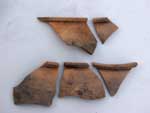 |
|
||||
|
|
The Project
The Whitehall Farm Villa and Landscape Survey is a long-term community based research project which is investigating the archaeological evidence for a Romano-British settlement near Nether Heyford, Northamptonshire. This project is partly funded by South Northants District Council is an inclusive collaboration between local people, academics and professional archaeologists to promote awareness and understanding of the archaeological and heritage potential associated with the locality. The archaeological work is carried out by members of the Whitehall Farm Roman Villa and Landscape Project (an affiliated society of the Community Landscape and Archaeology Survey Project, CLASP - see below). The archaeological director is Mr Stephen Young, Senior Lecturer, University College Northampton. Through CLASP, the Whitehall project is also supporting a Local Heritage Initiative funded project called "Local People: Local Past" which is investigating Roman Settlement across five surrounding parishes. The Whitehall project was organised in accordance with 'Policy and Guidance for Archaeological Projects in Northamptonshire', Northamptonshire Heritage (1995). It is a research excavation designed to provide diagnostic criteria and a methodological framework within which, for the first time, settlement of the Roman period in the region of the River Nene watershed can be identified, classified and understood. The information retrieved will provide a case study in the evolution of a Romano-British site against which material recovered through systematic field walking and geophysical survey of neighbouring settlements can be interpreted. Already the research undertaken is enabling a model of landscape development to be tested and evaluated. The importance of the work lies in the fact that although the area is known to be one of the most densely occupied areas of Roman Britain little is really documented about the nature of that experience. The excavation will assist in illuminating our understanding of the period and outline the influences of imperial Rome that had an impact on our region as well as reflect the regions diversity within Roman provincial life. Apart from the academic rationale behind the project the excavation is enabling local people to acquire training in archaeological techniques and post excavation work. It has raised their awareness and understanding of heritage issues and is creating a volunteer archaeological resource that can be deployed in the future to explore and record other periods and sites associated with the local landscape that are currently neglected through lack of resources. Finally, the project is keen to develop accessible interactive modes of data dissemination at both academic and popular levels. The Whitehall Project participates in CLASP (Community Landscape and Archaeology Survey Project) Visit the CLASP website - it will open in a new browser window. |
||||
|